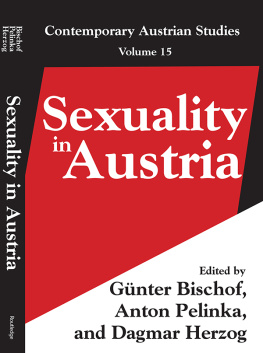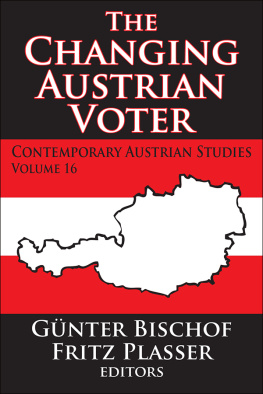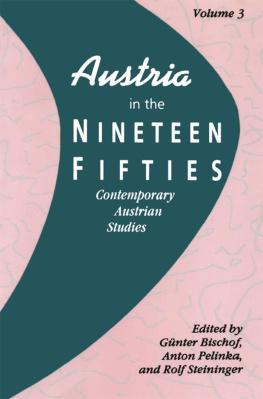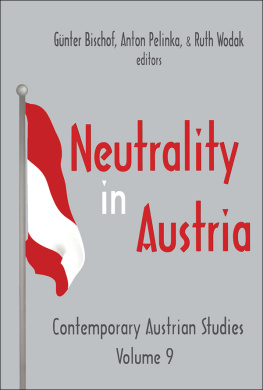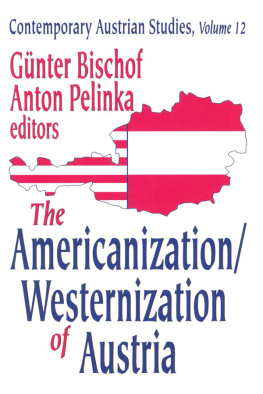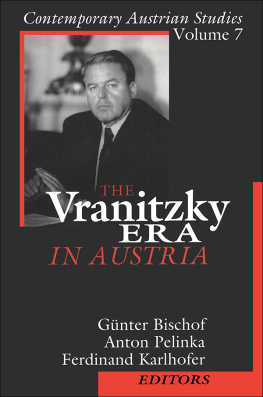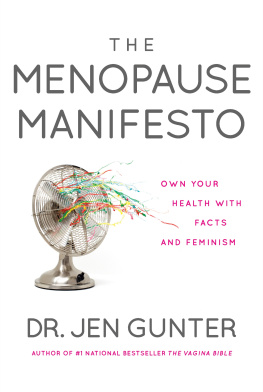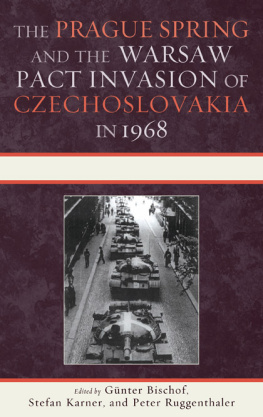Sexuality in
Austria
Contemporary Austrian Studies
Sponsored by the University of New Orleans and Universitt Innsbruck
Editors
Gnter Bischof, CenterAustria, University of New Orleans
Anton Pelinka, University of Innsbruck
Production Editor
Ellen Palli | Copy Editor
Jennifer Shimek | Assistant Editor
Josef Kstlbauer |
Executive Editors
Franz Mathis, UNO Coordinator, University of Innsbruck
Robert L. Dupont, Dean, Metropolitan College |
Advisory Board |
Ingrid Bauer
University of Salzburg
Siegfried Beer
University of Graz
Evan Bukey
University of Arkansas, Fayetteville
Mario Caciagli
University of Florence
Gary Cohen
Center for Austrian Studies
University of Minnesota
Christine Day
University of New Orleans
Wilhelm Kohler
Tbingen University
Jacques Le Rider
University of Paris VIII
Kurt Richard Luther
University of Keele
Andrei S. Markovits
University of Michigan, Ann Arbor
Margareta Mommsen
University of Munich
Hanspeter Neuhold
University of Vienna
Max Preglau
University of Innsbruck
Sonja Puntscher Riekmann
University of Salzburg
Peter Pulzer
Oxford University
Oliver Rathkolb
University of Vienna
Sieglinde Rosenberger
University of Vienna
Dieter Stiefel
University of Vienna
Franz Szabo
Center for Austrian Studies,
University of Alberta
Ruth Wodak
University of Lancaster
Publication of this volume has been made possible through one time generous post-Hurricane Katrina grants by the Austrian Ministry of Science and Research as well as the Austrian Ministry of Foreign Affairs through the Austrian Cultural Forum in New York. The Austrian Marshall Plan Anniversary Foundation in Vienna has also supported the production of this volume. Metropolitan College at the University of New Orleans and the Auslandsamt of the University of Innsbruck have provided additional financial support. The University of Chicago Press has granted permission to reprint David Lufts lead essay.
Sexuality in
Austria
Contemporary Austrian Studies,
Volume 15
Gnter Bischof,
Anton Pelinka,
and
Dagmar Herzog
editors
First published 2009 by Transaction Publishers
Published 2017 by Routledge
2 Park Square, Milton Park, Abingdon, Oxon OX14 4RN
711 Third Avenue, New York, NY 10017, USA
Routledge is an imprint of the Taylor & Francis Group, an informa business
Copyright 2009 by Taylor & Francis.
All rights reserved. No part of this book may be reprinted or reproduced or utilised in any form or by any electronic, mechanical, or other means, now known or hereafter invented, including photocopying and recording, or in any information storage or retrieval system, without permission in writing from the publishers.
Notice:
Product or corporate names may be trademarks or registered trademarks, and are used only for identification and explanation without intent to infringe.
Library of Congress Catalog Number: 2006051105
Library of Congress Cataloging-in-Publication Data
Sexuality in Austria / Gnter Bischof, Anton Pelinka, Josef Kstlbauer, editors.
p. cm. -- (Contemporary Austrian studies ; v. 15)
Includes index.
ISBN 1-4128-0606-2 (alk. paper)
1. Sex--Austria--History--20th century. I. Bischof, Gnter, 1953-II. Pelinka, Anton, 1941- III. Kstlbauer, Josef, 1976-HQ18.A9S48 2007 306.709436--dc22
HQ18.A9S48 2007
306.709436--dc22
2006051105
ISBN 13: 978-1-4128-0606-0 (pbk)
PREFACE
The Fifteenth Anniversary Issue
and the Stormy Season
Of all the fifteen issues of Contemporary Austrian Studies, this one was the most challenging to prepare for publication. I call it the emotional roller-coaster volume. The idea was born three years ago during a visit to Michigan State University in East Lansing, Michigan. There I first envisioned and discussed with Dagmar Herzog, who had just finished a monograph on sexuality in postwar Germany, the possibility of an issue on Sexuality in Austria. In a follow-up lunch meeting with Dagmar in an Arlington, Virginia, hotel during the annual meeting of the German Studies Association, we conceptualized the volume and drew up a list of names of scholars to be invited to contribute to this volume. Most of those contacted eagerly agreed to write essays; a few were hesitant and turned us down. Some agreed and did not deliver. Others joined late in the game when the volume was already conceptualized and sent us excellent work from their ongoing research projects. First and foremost, we are grateful to our contributors for helping us to make this volume a special one.
This fifteenth anniversary issue is a special one for a number of reasons. The essays were due by the end of 2005 in the midst of the aftermath of a devastating natural catastrophe in the Crescent City and along the Louisiana Gulf Coast. On August 29, Hurricane Katrina hit New Orleans; its 20 to 30-foot water surges broke the floodwalls of canals and inundated 80 percent of the city. A month later, Hurricane Rita hit the coast of western Louisiana and finished off what Katrina had left standing. The University of New Orleans (UNO), home of CenterAustria where CAS is produced, experienced some flooding and wind damage, but suffered the most devastation from some 2,500 storm survivors, who, abandoned and without food and water, went on looting binges throughout the campus. UNO staged an astounding comeback. It was the only university in the Crescent City that resumed classes in the fall. On 10 October, five weeks post-Katrina (the new way time is being measured in the Crescent City) on a satellite campus in the suburbs, 7,000 students resumed their studies with online courses; another 1,000 were taught in regular classrooms by a faculty that had been scattered across the continent only weeks before. In mid-January, some 750 students graduated, many of them as a result of UNOs gargantuan effort to salvage the fall term. Chancellor Timothy Ryan and his vice-chancellors and deans came together a few days after Katrina hit and were determined to have a fall term and to re-launch the university in spite of the 100 million dollars in damages the facilities had suffered, including a brand new business college that had opened its doors barely a month before Katrina. Clearly, there were institutional responses that upstaged FEMA, the laggard and disoriented federal agency whose failure became symptomatic of the disastrous governmental response to this unprecedented catastrophe.
Katrina scattered the CenterAustria staff, too, far and wide. Gertraud Griessner, who manages the Center on a daily basis, relocated with her family to Seattle, Washington, for the fall term to place her kids in school. She returned in December to her Mid-City home that had escaped flooding by mere inches. Margaret Davidson, the resident director of our Academic Year Abroad program in Innsbruck, saw her apartment in Slidell badly damaged. Living an hour southwest of New Orleans, I was lucky to reside in the least mangled parish of coastal Louisiana and to find my home still standing and undamaged. My family returned to Larose after a two-day evacuation vacation to Hot Springs, Arkansas. Ten days after the storm, I began commuting to Baton Rouge, teaching for the fall semester at Louisiana State University. Jennifer Shimek, our devoted long-time copy editor at Loyola University in New Orleans, relocated to her parents house in Erie, Pennsylvania, and returned by October to find that her new Uptown home had escaped flooding, too. The annual dissertation fellow at UNO, financed through the Austrian Ministry of Education, Culture, and Science, decided she had had enough of the stormy Gulf Coast and returned to Vienna two weeks after Katrina. Part of the job of the Ministry Fellow is to help with the daily production chores of


